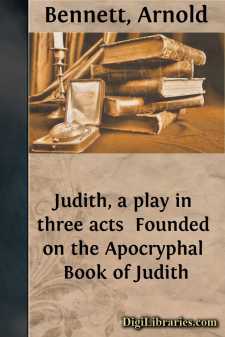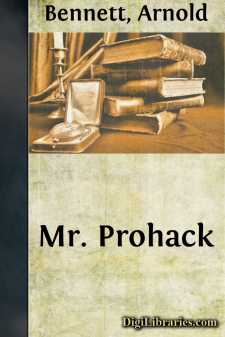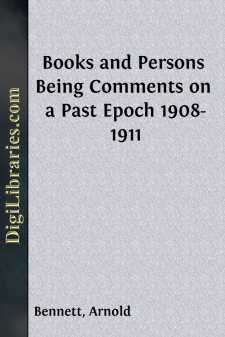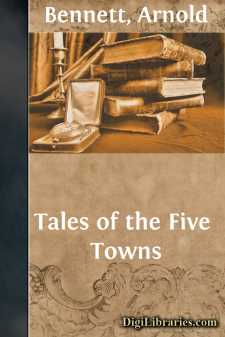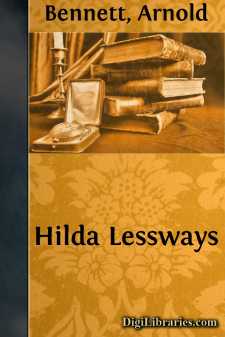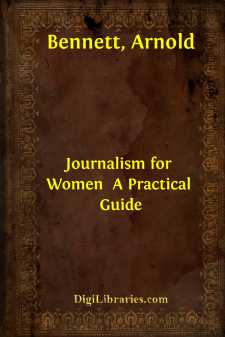Categories
- Antiques & Collectibles 13
- Architecture 36
- Art 48
- Bibles 22
- Biography & Autobiography 815
- Body, Mind & Spirit 144
- Business & Economics 28
- Children's Books 18
- Children's Fiction 14
- Computers 4
- Cooking 94
- Crafts & Hobbies 4
- Drama 346
- Education 58
- Family & Relationships 59
- Fiction 11834
- Games 19
- Gardening 17
- Health & Fitness 34
- History 1378
- House & Home 1
- Humor 147
- Juvenile Fiction 1873
- Juvenile Nonfiction 202
- Language Arts & Disciplines 89
- Law 16
- Literary Collections 686
- Literary Criticism 179
- Mathematics 13
- Medical 41
- Music 40
- Nature 179
- Non-Classifiable 1768
- Performing Arts 7
- Periodicals 1453
- Philosophy 65
- Photography 2
- Poetry 896
- Political Science 203
- Psychology 44
- Reference 154
- Religion 515
- Science 126
- Self-Help 85
- Social Science 82
- Sports & Recreation 34
- Study Aids 3
- Technology & Engineering 59
- Transportation 23
- Travel 463
- True Crime 29
Sort by:
by:
Arnold Bennett
I For years I had been preoccupied with thoughts of love—and by love I mean a noble and sensuous passion, absorbing the energies of the soul, fulfilling destiny, and reducing all that has gone before it to the level of a mere prelude. And that afternoon in autumn, the eve of my twenty-first birthday, I was more deeply than ever immersed in amorous dreams. I, in my modern costume, sat down between two...
more...
by:
Arnold Bennett
THE APPEAL If there is any virtue in advertisements—and a journalist should be the last person to say that there is not—the American nation is rapidly reaching a state of physical efficiency of which the world has probably not seen the like since Sparta. In all the American newspapers and all the American monthlies are innumerable illustrated announcements of "physical-culture specialists,"...
more...
by:
Arnold Bennett
ACT I A street in the city of Bethulia in Judea. Bethulia is in the hill country, overlooking the great plain of Jezreel to the south-west. Back, the gates of the city, hiding the view of the plain. Right, Judith's house, with a tent on the roof. Left, houses. The street turns abruptly, back left, along the wall of the city. Left centre, a built-up vantage-point, from which the plain can be seen...
more...
by:
Arnold Bennett
CHAPTER I I Arthur Charles Prohack came downstairs at eight thirty, as usual, and found breakfast ready in the empty dining-room. This pleased him, because there was nothing in life he hated more than to be hurried. For him, hell was a place of which the inhabitants always had an eye on the clock and the clock was always further advanced than they had hoped. The dining-room, simply furnished with...
more...
by:
Arnold Bennett
Chapter 1 THE PROMENADE The piece was a West End success so brilliant that even if you belonged to the intellectual despisers of the British theatre you could not hold up your head in the world unless you had seen it; even for such as you it was undeniably a success of curiosity at least. The stage scene flamed extravagantly with crude orange and viridian light, a rectangle of bedazzling illumination;...
more...
by:
Arnold Bennett
WILFRED WHITTEN'S PROSE 4 Apr. '08 An important book on an important town is to be issued by Messrs. Methuen. The town is London, and the author Mr. Wilfred Whitten, known to journalism as John o' London. Considering that he comes from Newcastle-on-Tyne (or thereabouts), his pseudonym seems to stretch a point. However, Mr. Whitten is now acknowledged as one of the foremost experts in...
more...
by:
Arnold Bennett
I It was an amiable but deceitful afternoon in the third week of December. Snow fell heavily in the windows of confectioners' shops, and Father Christmas smiled in Keats's Bazaar the fawning smile of a myth who knows himself to be exploded; but beyond these and similar efforts to remedy the forgetfulness of a careless climate, there was no sign anywhere in the Five Towns, and especially in...
more...
by:
Arnold Bennett
In the autumn of 1903 I used to dine frequently in a restaurant in the Rue de Clichy, Paris. Here were, among others, two waitresses that attracted my attention. One was a beautiful, pale young girl, to whom I never spoke, for she was employed far away from the table which I affected. The other, a stout, middle-aged managing Breton woman, had sole command over my table and me, and gradually she began...
more...
by:
Arnold Bennett
CHAPTER IAN EVENT IN MR. SKELLORN'S LIFE I The Lessways household, consisting of Hilda and her widowed mother, was temporarily without a servant. Hilda hated domestic work, and because she hated it she often did it passionately and thoroughly. That afternoon, as she emerged from the kitchen, her dark, defiant face was full of grim satisfaction in the fact that she had left a kitchen polished and...
more...
by:
Arnold Bennett
The Secret Significance of Journalism For the majority of people the earth is a dull planet. It is only a Stevenson who can say: "I never remember being bored;" and one may fairly doubt whether even Stevenson uttered truth when he made that extraordinary statement. None of us escapes boredom entirely: some of us, indeed, are bored during the greater part of our lives. The fact is unpalatable,...
more...




